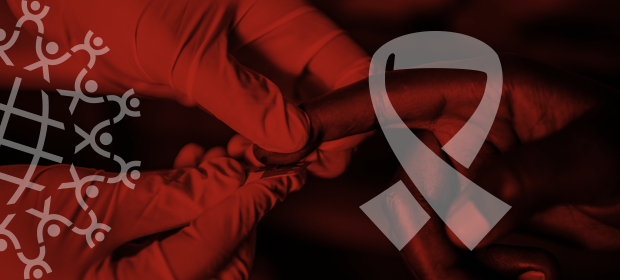Where We Work
See our interactive map


Whether he’s on his bike, giving a sermon, or counseling at the clinic, Reverend Lusale is ready to talk to anyone about HIV.
When the first AIDS case struck Zambia in 1984, Reverend Lusale was two years away from graduating from theology school, and did not know the impact the virus would have on Zambians’ lives, or on his own.
At its peak in Zambia in 2001, when 21.5% of the adult population was infected, he realized there was something he could do to help. Reverend Lusale decided to go for training as an HIV counsellor.
Today he works as part of IntraHealth International’s team of lay counsellors in the HIV Testing and Counselling Services (HTS) Program at Ngwerere, a testing and counseling facility in a peri-urban area in rural Lusaka, Zambia. He is one of six lay counselors who counsel clients, test them for HIV and tuberculosis, and refer those that are positive to the nearest health center.
He promotes HIV services during Sunday sermons and for farm workers onsite.
The reverend spends his days on his bike, which helps him reach more people in his community. Every Wednesday, he arrives at the Rural Health Center Community Hall to provide HIV testing and counseling services, and that is where I met him.
But he doesn’t stop there. He also promotes the services during Sunday sermons and, upon request by local commercial farm owners, offers HIV counseling and testing for farm workers onsite. Partnering with community leaders like Reverend Lusale makes a big difference in Zambia’s ongoing battle against HIV and tuberculosis—he brings dedication, the trust of his community, and the reach of his pulpit.
Ngwerere has a population of 13,873 and a 12% HIV prevalence rate, according to the district medical officer. It is one of seven high-HIV-burden districts within Lusaka, Southern, and Western provinces where IntraHealth now provides HIV testing and counseling services. The HTS program offers dedicated services for those at higher risk of HIV infection, including female sex workers, men who have sex with men, prisoners, adolescents, pregnant women, couples, and vulnerable mobile groups and minors.
Where demand for services among these groups is high, health workers offer HIV testing services door-to-door at lodges, the houses of female sex workers, busy markets, and border posts. They also provide testing for LGBTI (lesbian, gay, bisexual, trans, and/or intersex) groups. Clients gather at a central safe space and are provided group counseling and individualized services.
Reverend Lusale is unashamedly candid about his work. He interacts with anyone and everyone, including local sex workers, and listens to and answers every enquiry.
“You know, actions speak louder than words,” he says. “So we are teaching people in a safe environment how to use condoms.”
I asked him if being a man of God made it difficult for him to promote condom use.
“If I do nothing, I am killing my people!” he says. “I tell my people to use condoms because that is the right thing to do to save their lives. And since I am also the chairman for the Apostolic Pastors Fellowship in Ngwerere, I tell other pastors that giving condoms is good. Counseling skills have helped me a lot in my ministry—I am now counseling other clergymen. I have even spoken to my son and said to him, ‘If you want to have some of these condoms, take and give some to your friends!’”
I feel so grateful to help relieve the HIV burden of this community and our people.
One year after we first met, I return to the same local clinic, in one of the most HIV-affected areas in Ngwerere. I find Reverend Lusale at the ART section, following up on his previous referrals.
“Keeping track of even one person after testing for HIV can be complicated, but heartwarming,” he says. “The team has had to aggressively mobilize and learn on-the-go in order to be responsive to the specific needs of the community, and each of us wears several hats. There is so much to be done amidst high poverty levels, fears of stigma, and limited resources, but I am so proud of the work we are able to accomplish.”
He looks at me with a piercing gaze, as if to assess whether I understand. I do.
Being in a rural community, coping with such great need for HIV services and a seemingly ill-prepared health center magnifies the complexity of the services. But he and his team are using the training they gained through IntraHealth Zambia to follow up on all referrals and working with the health center partners to implement best practices for referred clients—including around complex issues such as access to antiretroviral therapy, CD4 count delays, stock-outs of HIV testing kits, and monitoring data on the epidemic to inform planning.
“I feel so grateful for the opportunity to serve and help relieve the HIV burden of this community and our people,” he says. “IntraHealth is doing amazing work in our communities and I feel so fortunate to be a part of it.”
Today Zambia’s HIV prevalence rate has fallen to 12.9% among adults aged 15–49, thanks to Reverend Lusale and others. It is only with dedicated people like him that Zambia will see the end of the virus.
IntraHealth’s Improving and Expanding Access to and Uptake of HIV Testing and Counseling Project is funded by the US Centers for Disease Control and Prevention. Jacqueline Kabeta contributed reporting to this piece.
Get the latest updates from the blog and eNews




